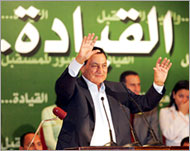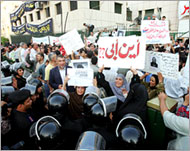Egypt allows local poll monitors
The Egyptian judiciary has authorised local non-governmental organisations to monitor the historic 7 September poll, a decision hailed as a major step towards ensuring a more transparent election.

On the eve of the three-week campaign’s closing day, the judiciary also excluded one of the 10 candidates from the race after a rival challenged him as leader of his party.
Overruling the electoral commission’s earlier decision to ban independent NGOs, an administrative court argued that “the monitoring process was not part of the commission’s prerogatives”, judiciary sources said.
Judge Faruq Abdel Kader said the presence of independent Egyptian civil society groups was necessary to ensure “the transparency of the vote”.
A coalition of independent NGOs had filed the case with a Cairo administrative court demanding the electoral commission go back on its decision to restrict supervision duties to the country’s judges.
Decisions by the electoral commission cannot be overruled, but the judiciary circumvented the problem by ruling that the issue of monitoring was outside the commission’s competence.
Undercover monitors
The commission – which opposition forces and observers have said is controlled by President Hosni Mubarak’s ruling party – can appeal the decision.
 |
|
Egyptians are urged to boycott |
“This is a big step forward. We couldn’t believe it. We expected the verdict to be negative,” Mohammed as-Sawy, from the largest coalition of NGOs, told AFP.
He said that 22 NGOs had made plans to deploy hundreds of trained monitors across the country and to use voters as undercover monitors in some of the country’s near 10,000 polling stations.
The judges’ syndicate had warned on Friday that it could not guarantee the transparency of Egypt’s first contested presidential poll without the assistance of independent NGOs.
Despite repeated calls from Washington, Cairo has refused to allow the presence of international monitors.
Demands
However, the judges made other demands during a special meeting of the syndicate on Friday that still haven’t been met and threaten the monitoring process.
They demanded that recently-appointed state prosecutors be excluded from the judges’ monitoring contingent, that a copy of the results for each polling station be handed to party delegates and that the decision to expel 2000 judges from the syndicate be annulled.
The judiciary also announced that it had excluded Wahid al-Luxori from the presidential race.
He had registered his candidacy as leader of the Egypt Arab Socialist Party, but Ayman Mohammed Siddiq had challenged it, claiming he was the movement’s real leader.
The administrative court said in its verdict that Luxori’s candidacy would be invalidated pending a legal solution to the party’s leadership dispute.
 |
|
Many groups say they do not |
The presidential electoral law states that only a party leader or a candidate who received the signatures of 250 elected officials could stand in the election.
The 52-year-old was one of the least heralded among the 10 candidates for Egypt’s first competitive presidential election and he told AFP he would challenge the decision by filing an appeal.
According to legal experts, the surprise decision raised questions over the polling process, as the law states that the vote should be delayed and candidacy registration re-opened if one of the contenders is excluded.
The campaign, which kicked off on 17 August, officially closes at midnight on Sunday.
Boycott urged
On Saturday, six Egyptian non-governmental rights groups urged Egyptians to boycott the election or to vote against Mubarak.
The six groups, mainly among the smaller of Egypt’s rights organisations, said they issued the statement because of inadequate guarantees that the vote would be free.
Many groups have said they do not expect a fair race, particularly complaining about the presidential election committee’s decision to bar independent monitors from polling stations. But they have not advised Egyptians how to vote.
“The Egyptian rights organisations which signed this statement called on Egyptian citizens to boycott the presidential elections … because of the absence of real guarantees for free elections,” said the statement by the six groups.
‘Anyone except Mubarak’
It added that voters who decided to cast ballots should choose anyone except Mubarak.
|
“These cosmetic elections will only lead to increasing the dictatorial grip of Hosni Mubarak’s regime in Egypt” Hisham Mubarak Law Centre and five NGOs |
“These cosmetic elections will only lead to increasing the dictatorial grip of Hosni Mubarak’s regime in Egypt,” said the statement signed by the Hisham Mubarak Law Center and five NGOs.
Some activists were critical of the statement. Ahmed Borai, head of Group for Democratic Development which did not sign, said NGOs should not be advising voters who to choose.
Saturday’s court ruling to allow monitors into polling stations would meet a key NGO demand. But Ahmed Samih of the National Campaign for Monitoring Elections (NCME), one of the NGO alliances planning to field monitors, said the authorities
could appeal the ruling which might hinder its implementation.
It was not immediately clear whether the election oversight committee would be bound by the ruling. Election rules say the committee’s decisions are final.
Committee officials were not available to comment.